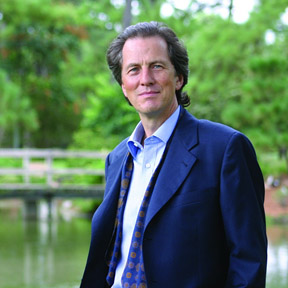 Andreas Klein is a Juilliard-trained, internationally acclaimed concert pianist who’s brought to vivid life works by some of the finest composers in history. His magnetic playing has been heard in such famous halls as Berlin's Philharmonic and New York’s Carnegie.
Andreas Klein is a Juilliard-trained, internationally acclaimed concert pianist who’s brought to vivid life works by some of the finest composers in history. His magnetic playing has been heard in such famous halls as Berlin's Philharmonic and New York’s Carnegie.
Yet with such glowing credentials, the German-born Klein, like many other traveling pianists, is often only as good as the instrument he’s paired with.
"It’s important to find a good instrument because the best acoustics in a hall don’t really help you if the piano is not very good," Klein said during a recent phone interview. "That’s a big problem for pianists traveling, because they cannot take their own instrument. You have to play on whatever the presenter gives you, and you have to make friends with the instrument in a quick time, adapt to the situation."
Which makes his concert Sunday at Wabash College all the more enticing. Wabash alum John Failey, Class of 1972, one of the college’s first music graduates, donated a new Steinway B piano to Wabash, as well as funded the restoration of its Bosendorfer piano.
Sunday’s show, part of the college’s Visiting Artists Series, starts at 4 p.m. in Salter Concert Hall in the Fine Arts Center. Seating for the series is general admission, though free tickets are required and may be reserved by e-mailing boxoffice@wabash.edu or calling 361-6411 between 8:30 a.m.-12 p.m. and 1:30-4 p.m. Monday-Friday. The box office opens 90 minutes before curtain time. Tickets not claimed 10 minutes before showtime will be released to the general public.
The Steinway will be dedicated—and Failey and his wife, Jill, recognized—during the performance. Failey served as president of the family business, Engineered Cooling Systems Inc. in Carmel, before it was sold last year. This donation is his way of giving back to and staying connected with a music program that gave him so much.
"Wabash before had an older instrument that was pretty well worn out," Failey said by phone recently. "They got a lot of good use out of it, but it made more sense to replace it."
Because the Austrian-made Bosendorfer is so exceptional and fancy, Failey couldn’t see the sense in Wabash unloading it.
"Now the college has two fine instruments to use," he said. And a visiting musician with matching caliber. Klein’s program Sunday is called "Mozart and His Shadow." There also will be sonatas by Beethoven and Schubert featured.
"The purpose of this program is, first of all, to celebrate the 250th anniversary of Mozart’s birth in 1756," Klein said. "But instead of just presenting an all-Mozart program, I thought that might be a bit too one-sided. So I want to showcase the fact that the spirit of Mozart and his artistry transcends to later composers, like Schubert and Beethoven, who were somehow influenced by Mozart — directly or indirectly."
Besides channeling some of classical music’s greatest works, Klein also records them. He bought his first tape recorder in the 1960s and used it to monitor his progress during practices. Since gaining knowledge and acquiring equipment, Klein has recorded literally hundreds of concerts and provided master tapes for CD productions in the greater Houston area. He’s come to appreciate both sides of the business, but doesn’t compare them.
"When I’m playing music, then making music, recreating the piece, especially when you perform it, that’s a great enjoyment," Klein said. "That’s what I was trained for and really what is at the core of my life. The recording side and the production of music is something where you sit, so to speak, on the other side of the table, and you observe other people performing. You try to capture what they convey with their performance to the listener."
Klein finds keeping an audience captivated one of the toughest challenges for classical musicians today. He said European observers used to be better because they were exposed to the form more than Americans. Now, with technology rapidly advancing toward on-demand anything, attention spans get shorter and shorter. Klein offers sage advice on the matter: "Just get engrossed in listening to one thing."
This article was originally published in the Crawfordsville Journal-Review.